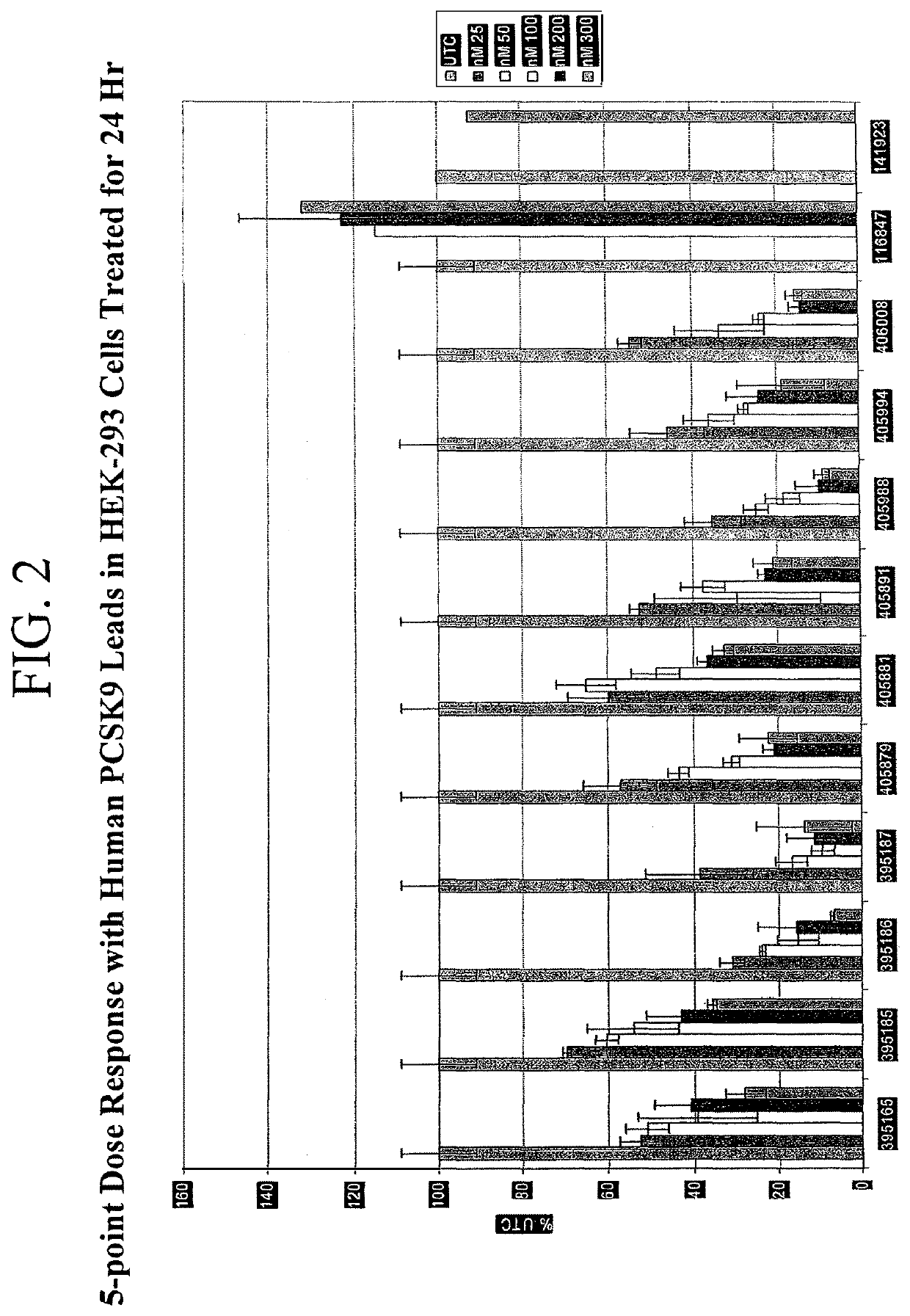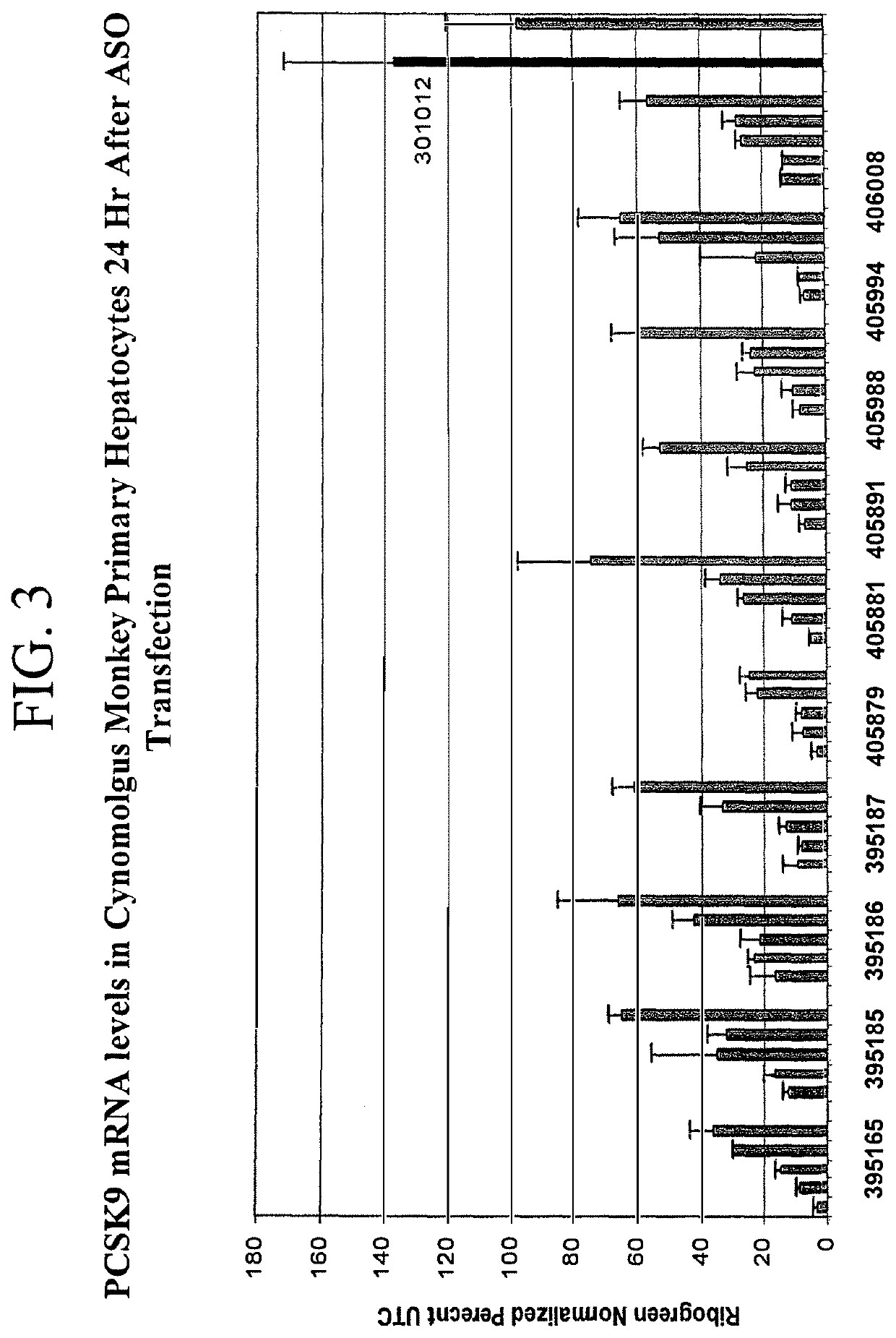Methods for treating hypercholesterolemia
a hypercholesterolemia and hypercholesterolemia technology, applied in the field of hypercholesterolemia treatment methods, can solve the problems of reduced hepatic uptake and elevated cholesterol, and achieve the effects of high half-lives, favorable pharmacokinetics, and high stability and resistance to nucleases
- Summary
- Abstract
- Description
- Claims
- Application Information
AI Technical Summary
Benefits of technology
Problems solved by technology
Method used
Image
Examples
example 1
Inhibition of Human PCSK9: A549 Cells
[0907]Antisense oligonucleotides targeted to a PCSK9 nucleic acid were tested for their effects on PCSK9 mRNA in vitro. Cultured A549 cells at a density of 4000 cells per well in a 96-well plate were treated with 60 nM of antisense oligonucleotide. After a treatment period of approximately 24 hours, RNA was isolated from the cells and PCSK9 mRNA levels were measured by quantitative real-time PCR, as described herein. PCSK9 mRNA levels were adjusted according to total RNA content as measured by RIBOGREEN®. Results are presented as percent inhibition of PCSK9, relative to untreated control cells. Antisense oligonucleotides that exhibited at least 30% inhibition of PCSK9 expression are shown in Table 16.
[0908]The motif column indicates the wing-gap-wing motif of each antisense oligonucleotide. Antisense oligonucleotides were designed as 5-10-5 gapmers, or alternatively as 3-14-3 gapmers, where the gap segment comprises 2′-deoxynucleotides and each w...
example 2
Inhibition of Human PCSK9 in HepG2 Cells
[0913]Antisense oligonucleotides were tested for their ability to inhibit the expression of PCSK9 mRNA in cultured HepG2 cells. HepG2 cells at a density of 10000 cells per well in a 96-well plate were treated with 1500 nM of antisense oligonucleotide. After a treatment period of approximately 24 hours, RNA was isolated from the cells and PCSK9 mRNA levels were measured by quantitative real-time PCR, as described herein. PCSK9 mRNA levels were adjusted according to total RNA content as measured by RIBOGREEN®. Results are presented as percent inhibition of PCSK9, relative to untreated control cells.
[0914]Isis Nos. 399819, 395149, 395150, 395151, 395152, 395153, 395154, 395155, 395156, 395157, 395158, 395161, 395162, 395163, 395164, 395165, 395166, 395167, 395168, 395172, 395173, 395174, 395178, 395179, 395182, 395183, 395185, 395186, 395187, 395189, 395190, 395191, 395193, 395194, 395195, 395198, 395199, 395203, 395207, 395210, 395211, 395213, 3...
example 3
Inhibition of Human PCSK9 (Hep3B Cells)
[0918]Antisense oligonucleotides targeted to a PCSK9 nucleic acid were tested for their effects on PCSK9 mRNA in vitro. Cultured Hep3B cells at a density of 4000 cells per well in a 96-well plate were treated with 75 nM of antisense oligonucleotide. After a treatment period of approximately 24 hours, RNA was isolated from the cells and PCSK9 mRNA levels were measured by quantitative real-time PCR, as described herein. PCSK9 mRNA levels were adjusted according to total RNA content as measured by RIBOGREEN®. Results are presented as percent inhibition of PCSK9, relative to untreated control cells. Antisense oligonucleotides that exhibited at least 30% inhibition of PCSK9 expression are shown in Tables 17, 18, and 19.
[0919]The motif column indicates the wing-gap-wing motif of each antisense oligonucleotide. Antisense oligonucleotides were designed as 5-10-5 gapmers, or alternatively as 3-14-3 gapmers, or alternatively as 2-13-5 gapmers where the g...
PUM
 Login to View More
Login to View More Abstract
Description
Claims
Application Information
 Login to View More
Login to View More - R&D
- Intellectual Property
- Life Sciences
- Materials
- Tech Scout
- Unparalleled Data Quality
- Higher Quality Content
- 60% Fewer Hallucinations
Browse by: Latest US Patents, China's latest patents, Technical Efficacy Thesaurus, Application Domain, Technology Topic, Popular Technical Reports.
© 2025 PatSnap. All rights reserved.Legal|Privacy policy|Modern Slavery Act Transparency Statement|Sitemap|About US| Contact US: help@patsnap.com



